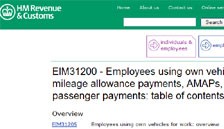After months of delays, HMRC has finally published clarification of next April's changes to the capital allowance tax scheme.
Capital allowances allow businesses to write off the costs of capital assets against their taxable income.
They take the place of commercial depreciation, which is not allowed for tax.
In a statement published last night, HMRC said:
Budget 2008 announced the abolition of the current rules for “expensive cars”, replacing them with an environmentally-based pooling system.
The rate of writing-down allowance will be based on the CO2 emissions of the car.
The restriction on allowable lease rentals for businesses that lease or hire cars will also be based on the CO2 emissions of the car.
The new rules will generally have effect on and after 1 April 2009 for businesses in the charge to corporation tax, and on and after 6 April 2009 for businesses in the charge to income tax.
Currently there are special capital allowances rules for cars:
- expenditure on cars with very low carbon dioxide emissions (up to 110g/km) can qualify for 100 per cent first-year allowances;
- expenditure on cars costing £12,000 or less is eligible to go into the
main pool and WDAs given at 20 per cent per annum on the reducing
balance; - expenditure on cars costing over £12,000 must be dealt with separately from expenditure on other assets with expenditure on each car being
allocated to a single asset pool. The WDAs are calculated in the normal way (at 20 per cent) and then restricted to an annual amount of
£3,000. However, when the car is sold any unrelieved depreciation is allowed through a balancing allowance, while any excess allowances over economic depreciation are recovered through a balancing charge.
From April 2009 the special rules that restrict the amount of capital allowances for cars costing more than £12,000 will be abolished and
replaced by new rules.
Qualifying expenditure incurred on or after
1 or 6 April 2009 on cars will be allocated to one of the two general plant and machinery pools.
The pool that is appropriate will depend on the car’s CO2 emissions.
Expenditure on cars with CO2 emissions over 160g/km will be dealt with in the special rate pool and will attract WDAs at 10%.
Cars that have an element of non-business use will continue to be dealt with in a single asset pool to enable the private use adjustment to be
made, but for expenditure incurred from April 2009 onwards the rate of WDA will be determined by the car’s CO2 emissions.
Expenditure incurred before April 2009 will, in general, continue to be subject to the old “expensive” car rules for a transitional period of around five years.
After this transitional period, any expenditure remaining in a single asset pool (unless there is any non-business use of the car) will be transferred to the main capital allowances pool.
From April 2009, the special rules that restrict the amount of lease rental payments that can be deducted for tax purposes for a car costing more than £12,000 will be reformed.
The restriction will be changed to a flat rate disallowance of 15% of relevant payments and apply only in respect of cars with CO2 emissions above 160g/km.
At present the restriction applies to all links in a chain of leases. From April 2009, it will only apply to one lease.
Expenditure under leases that commenced prior to 1 or 6 April (that is where the car is made available before April 2009) will continue to be subject to the “old” rules.
Certain hire cars (cars used as taxis, daily hire cars and cars leased to disabled people) are currently exempt from the “expensive car rules”, but will be subject to the new CO2 emissions based rules.
In Budget 2008, the government announced its intention that, subject to state aid approval, expenditure on cars leased to those in receipt of certain disability allowances would be placed in the 20% pool, regardless of their CO2 performance.
This remains the government’s intention.
However, the government has agreed with the main UK supplier of leased cars to disabled people that it would be in the best interests of their customers to defer an application for state aid approval at the present time.
Initiatives are being taken to increase the availability of cars with low emissions for lease by disabled people within a wide choice of affordable cars.
Motorcycles are to be excluded from the definition of cars and will not therefore, be subject to these rules.
Expenditure incurred on motorcycles on or after 1 or 6 April 2009 will qualify for Annual Investment Allowance.
A technical note with draft legislation for inclusion in Finance Bill 2009, explanatory notes and an Impact Assessment will be published shortly.














Login to comment
Comments
No comments have been made yet.